As an online business owner, you want to make potential customers trust your business enough that they buy from it.
One way to achieve this is to remain transparent in how you collect, manage, and display reviews on your website. This is where a review disclaimer comes in.
A review disclaimer is a statement that details the nature of reviews on your website. Through this disclosure, you’re able to state any conflicts of interest from partnerships that might introduce biases, demonstrating your integrity to your customers.
Below, we’ll guide you on how to craft an effective review disclaimer by talking about what to include and offering practical examples from reputable businesses.
- You need a review disclaimer if you display customer reviews or receive compensation for product mentions.
- Your review disclaimer should be clear, concise, and prominently displayed on your website. Use a disclaimer page or pop-up, or include it near review sections.
- When crafting a review disclaimer, use a disclaimer generator as a starting point to ensure it aligns with legal requirements.
Table of Contents
PRO TIP: Take the hassle of writing your own disclaimer away with our disclaimer generator trusted by over 200,000 businesses. It’ll save you hours of work and possible costly legal mistakes.
Types of Review Disclaimers
Understanding the different types of review disclaimers can help you choose the right one for your business needs. Here are some of the most common types:
Product Review Disclaimer
A product review disclaimer is necessary when reviews are based on free products received from manufacturers.
This statement clarifies that although the product was provided at no cost, the opinions expressed are honest and based on the reviewer’s actual experience.
For example, in this protein powder review from the blog, Guide to Vegan, you can see this short but effective disclaimer:

By adding this product review disclaimer, Guide to Vegan maintains its credibility, especially since the review could influence a reader’s purchase decision.
Consumer Peer Review Disclaimer
This type of disclaimer is used on platforms where customers post reviews of products or services they have purchased. These include platforms that host user-generated content, such as eCommerce sites and online forums.
It often goes like this,
“The reviews expressed on this site are those of individual consumers and do not necessarily reflect the views of [Business Name].
We do not endorse or guarantee the accuracy of any review. Product experiences may vary. Please use your judgment when relying on reviews to make purchasing decisions.”
With a consumer peer review disclaimer, readers understand that the reviews are subjective opinions of the consumers and that the business does not endorse the views expressed by these reviews.
Movie Review Disclaimer
A movie review disclaimer is used by critics and bloggers who write reviews of films. It typically states that the review reflects the personal opinion of the reviewer and is not influenced by any advertisement deals or sponsorships.
For example, at the bottom of a movie review on this site, you can see this sample movie review disclaimer:

This straightforward disclaimer helps maintain the site’s integrity and assures the readers of an unbiased critique.
Endorsement Disclaimer
When a review includes endorsements, it needs an endorsement disclaimer. Here, the reviewer clarifies that they may be compensated through affiliate links or direct payments for reviewing the product.
To be clear and conspicuous, the disclaimer should inform readers that clicking on links or making purchases through the review might benefit the reviewer financially.
It can sound something like,
“This review may contain affiliate links, meaning we could earn a commission at no extra cost to you if you click and make a purchase. Additionally, we may receive compensation from the product’s manufacturer for endorsements.
The opinions expressed here are solely our own and based on personal experience. We strive to provide honest and unbiased reviews, regardless of any financial incentives. Please consider this when evaluating the information provided.”
This wording ensures that readers are fully informed about the potential financial interests behind the review, allowing them to make more informed decisions.
PRO TIP: To protect your business, check out FTC’s updated Endorsement Guide regarding the use of consumer reviews and testimonials.
Advertisement Disclaimer
This disclaimer is used when reviews are part of a paid advertisement campaign. It informs readers that the content they are reading is sponsored and functions as an ad.
That said, you can also clarify that the paid advertisements do not affect how the content is written, as in the case of the National Apartment Association:
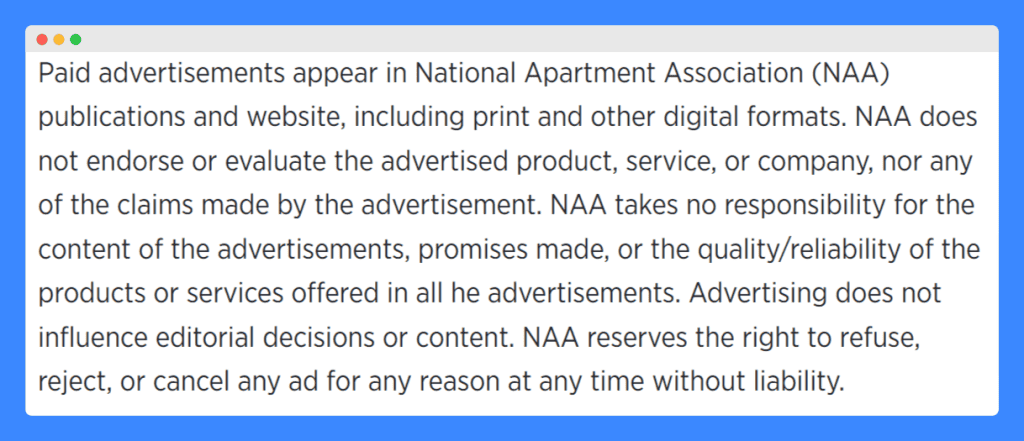
Who Needs a Review Disclaimer?
Any website or blog that publishes reviews or testimonials, especially if there’s any affiliation or relationship with the supplier, needs to use a disclaimer.
Doing so shows transparency about sponsored content or any incentives, such as receiving a product for free, which could influence the review.
Here are some examples:
Bloggers and Influencers
For bloggers and influencers, a review disclaimer is crucial when posts include sponsored content or endorsements. Whether promoting a product for free or as part of a paid collaboration, using a disclaimer clarifies their impartiality and any affiliations.
This is why you’ll often find influencer posts with the hashtag #sponspored or #ad, like this one from Instagram user, leony.music:

eCommerce Websites
eCommerce platforms should have a disclaimer in place to discuss how they collect and manage user-generated reviews.
These eCommerce websites are not just a place for self-promotion but a resource for potential buyers to make informed decisions. Disclaimers help verify the authenticity of these reviews.
Amazon, eBay, and Etsy, for example, rely heavily on user-generated content. A review disclaimer not only protects them from potential legal issues but also helps maintain their credibility.
Review Websites
Websites dedicated to reviews act as a place where potential buyers can talk about products, services, or businesses.
Reviews on these websites may be influenced by various factors. Thus, a disclaimer is necessary to inform readers about how they are curated and if there’s any bias or compensation involved.
Businesses With User Reviews
Businesses that allow customer reviews on their platforms need to clearly state if there’s any screening or incentive for reviews. This transparency helps readers know that reviews are genuine and not just promotional content.
Affiliate Marketers
Affiliate marketers must include an affiliate disclaimer when a review may lead to commissions on sales through affiliate links. This disclaimer is essential to inform readers that their purchases help support the marketer’s business.
Media Outlets
For media outlets, disclaimers are necessary when publishing reviews that could be seen as endorsements.
Whether a book, film, or tech gadget review, it’s important to clarify any sponsorship or if a product was received for free. Doing so helps readers know that the reviews are honest and unbiased.
Why Do You Need a Review Disclaimer for Your Website?
You need a review disclaimer for your website for transparency and to maintain trust with your audience.
Adding a disclaimer also ensures compliance with Federal Trade Commission (FTC) guidelines, which are in place to safeguard both the seller and the consumer against potentially deceptive practices.
According to the FTC’s strict rules, all endorsements must reflect the honest opinions of the reviewer. They also need to disclose whether they received a free product or service for it or if they have a relationship with the seller.
7 Key Components of a Review Disclaimer
Since the goal is to let your target market know that the reviews are helpful and ethical, your disclaimer should address transparency, legal compliance, and reader trust.
Here are key components that should be part of every review disclaimer:
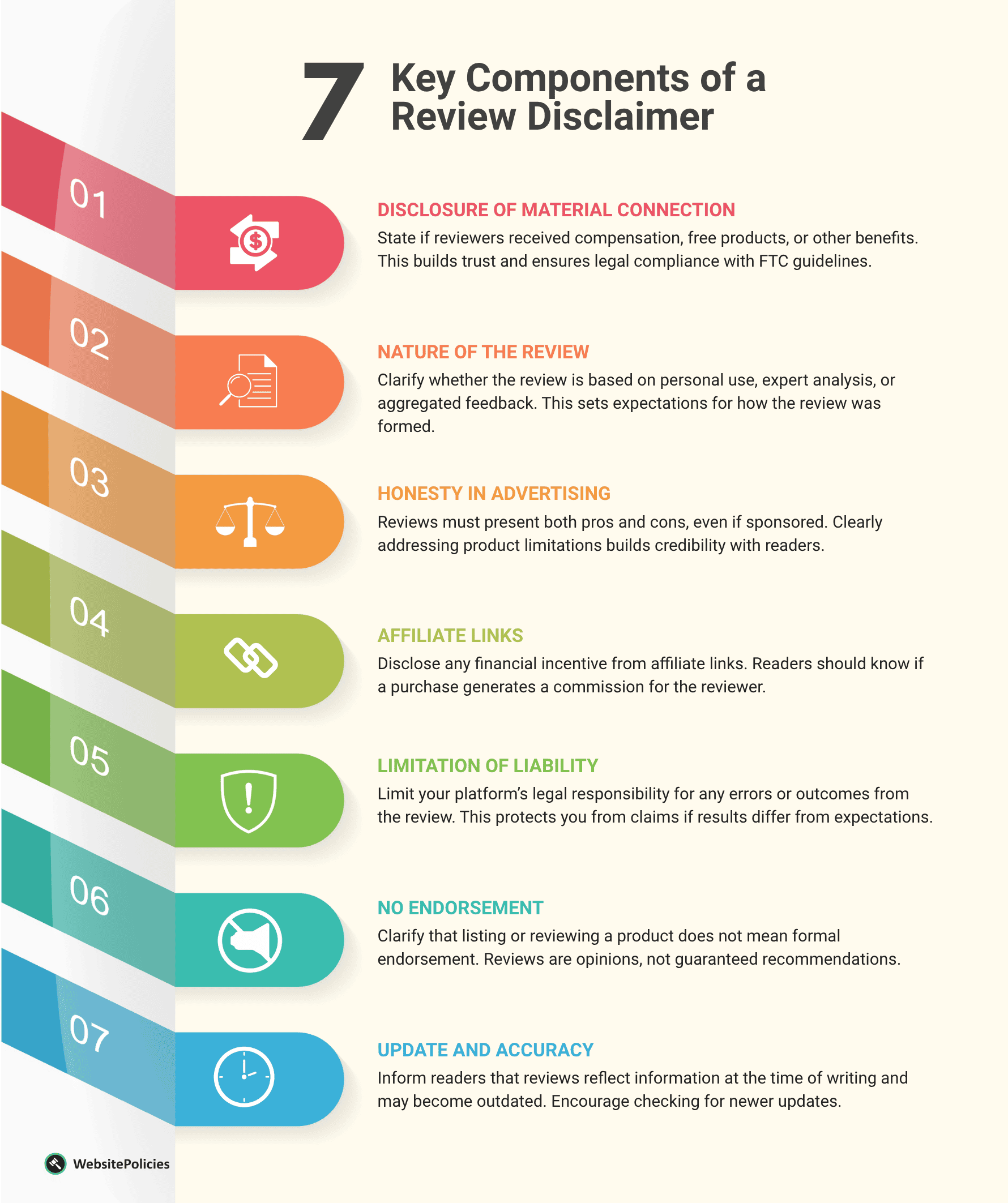
Disclosure of Material Connection
This refers to the explicit declaration of any relationships or benefits that might influence the content of a review.
It can include detailing whether you or your reviewers have received payment of any kind, free products, services, or any other form of compensation that could affect the impartiality of the review.
By law, it’s required to disclose if you are getting paid to write the review, or if receiving the product itself was contingent upon writing a public evaluation.
Nature of the Review
When you review products or services, it is important to clarify whether these reviews are based on personal use and testing, expert analysis, or aggregated consumer feedback.
This helps set the expectations for your readers regarding what kind of information they are receiving—whether it’s a subjective personal opinion, a technical expert review, or a summary of user experiences.
By explicitly stating the nature of the review, you help readers understand the scope and angle of the review content. In turn, this aids them in making more informed decisions based on the reviews of products or services on your site.
Honesty in Advertising
This part shows the reviewer’s commitment to providing an honest and unbiased review regardless of any relationships with advertisers or sponsors.
Reviewers are expected to warn readers of any drawbacks or issues alongside the product’s favorable features.
For instance, if a product or service can’t help but fall short in certain aspects—such as not delivering the promised durability or efficiency—the review should openly discuss these shortcomings.
Affiliate Links
This involves disclosing any financial relationships between the reviewer and the provider of the products or services being reviewed.
One example is when a reviewer earns a commission or receives other forms of compensation through links in their content.
For example, Amazon banned incentivized reviews unless they were facilitated through its own Amazon Vine program. This policy was put in place to ensure that reviews remain unbiased and not influenced by potential earnings from affiliate commissions.
PRO TIP: To understand the importance of review disclaimers for eCommerce platforms, learn more about Amazon’s Anti-Manipulation Policy for Customer Reviews.
Limitation of Liability
This part aims to reduce the legal responsibility of the reviewer or the website hosting the reviews in case the information provided leads to unexpected outcomes.
Typically, it specifies that the website or the reviewers cannot be held liable for any inaccuracies in the reviews or any decisions made based on the information provided.
In turn, this protects the review platform from legal actions if a reader feels they have been misled by a review, especially if the outcome of using a product or service is perceived as unfair.
No Endorsement
This is where the disclaimer clarifies the relationship between the review content and the actual endorsement of the products and services being discussed.
For example, it can be said that while the reviews cover various products and services, the presence of such reviews does not constitute a formal endorsement or recommendation by the website or the reviewer.
This way, readers understand the reviews are meant to provide information and personal opinions, not a promotional push to buy the products and services.
Update and Accuracy
This component of a review disclaimer addresses the temporal nature of the content provided. Essentially, it informs readers that the details in a review might become outdated or less accurate as circumstances change.
Some disclaimers also assure readers that efforts are made to ensure the accuracy and relevancy of the reviews at the time of publication. However, the facts and opinions can’t change as new information becomes available or as products and services evolve.
By including this statement, readers are reminded to consider the date of the review and verify if more recent information might be available before making decisions.
How Do You Write a Review Disclaimer for Your Business?
Here’s a straightforward guide to help you create a clear and effective review disclaimer.
Step 1: Identify the Nature of Reviews
Begin by detailing the type of reviews you publish. Whether they’re based on personal use, expert analysis, or customer feedback, clearly state this to set the right expectations.
Step 2: Disclose Any Relationships
Explicitly disclose any relationships or partnerships that could influence the review content. This includes sponsorships, affiliate relationships, or if reviewers received products or services for free.
Step 3: Clarify the Scope of Endorsements
Make it clear that the presence of a review does not constitute an endorsement of the product or service reviewed. This helps manage expectations and maintains your site’s credibility.
Step 4: Mention Affiliate Links
If your reviews include affiliate links, tell your readers about this. Explain that the site earns a commission if readers choose to purchase through these links.
Step 5: Add a Liability Clause
Include a limitation of liability to protect your business from claims related to the accuracy or applicability of the reviews.
Step 6: State the Currency of Information
Clarify that the reviews reflect the conditions at the time of writing and that the information provided can’t change without notice. Encourage readers to verify the currentness of the data if necessary.
PRO TIP: If you’re unsure where and how to start, consider using a free disclaimer generator. They provide a solid starting point so your disclaimer covers all the legal aspects.
Where to Display a Review Disclaimer
Display your review disclaimer where it is easily accessible and visible to all readers, especially those using a mobile device. This could be:
- Disclaimer Page: A dedicated page on your website that houses the full review disclaimer.
- At the Bottom of Each Review: Include a brief version of the disclaimer with a hyperlink to the full text on the Disclaimer Page.
- In the Website Footer: Adding a link to the review disclaimer here ensures visibility on every page.
- Within the About or FAQ Sections: Integrate the review disclaimer into your About or FAQ sections where users often look for site policies.
- Checkout or Sign-up Pages: If your reviews influence purchase decisions, consider adding a disclaimer prompt at points of transaction.
Review Disclaimer Examples You Can Learn From
Looking at real-world examples can provide valuable insights into how successful businesses across different industries approach this task.
Here are some examples of review disclaimers to inspire your own:
1. Emily Noel, Beauty Influencer on YouTube
Emily Noel’s disclaimer serves as an excellent product review disclaimer example for vloggers and influencers.
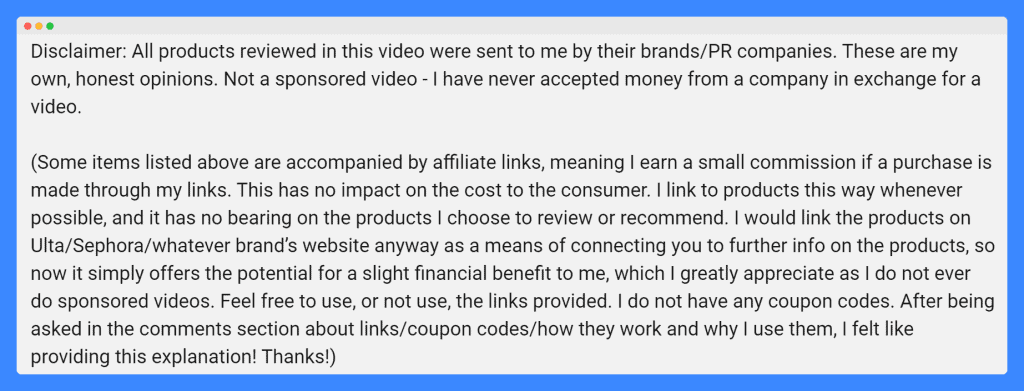
Her transparent approach to disclosing affiliate links and the reasons behind their use is commendable. It builds trust with her audience and clearly outlines the potential benefits she might receive from their actions.
2. Wish.com
Wish.com provides a strong example of how an eCommerce website can effectively use a review disclaimer within its Terms of Use.
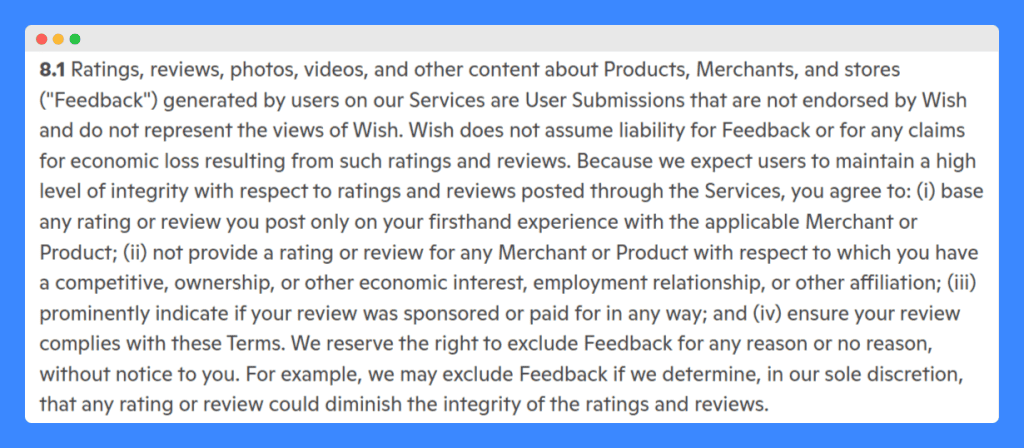
Their disclaimer effectively communicates that Wish does not endorse user-generated reviews and that such content does not reflect the company’s views. It also outlines user responsibilities, emphasizing integrity and honesty in providing feedback.
3. TripAdvisor
TripAdvisor is a leading example of how review websites can effectively implement a review disclaimer.

Through this disclaimer, TripAdvisor guarantees that users understand the nature of the content on the site and the company’s role in moderating it.
4. StumpTown Coffee Roasters
Stumptown Coffee Roasters’ approach to disclosing the nature of reviews is both transparent and accessible, making it easy for readers to understand without wading through legal jargon.
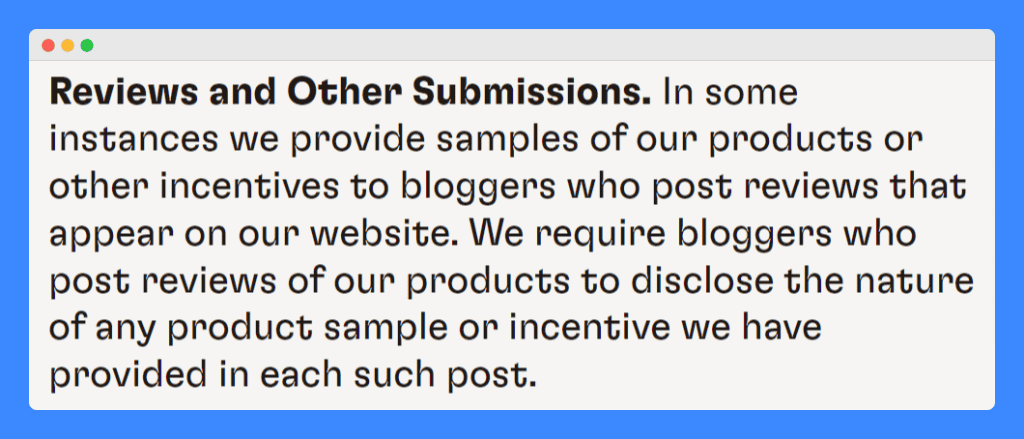
The disclaimer is concise and to the point, providing the necessary information without overwhelming the reader. This makes it more engaging and less likely to be ignored by users.
5. Epic Gardening, an Amazon Affiliate
Epic Gardening’s disclaimer is a prime example of a comprehensive and transparent affiliate disclosure.
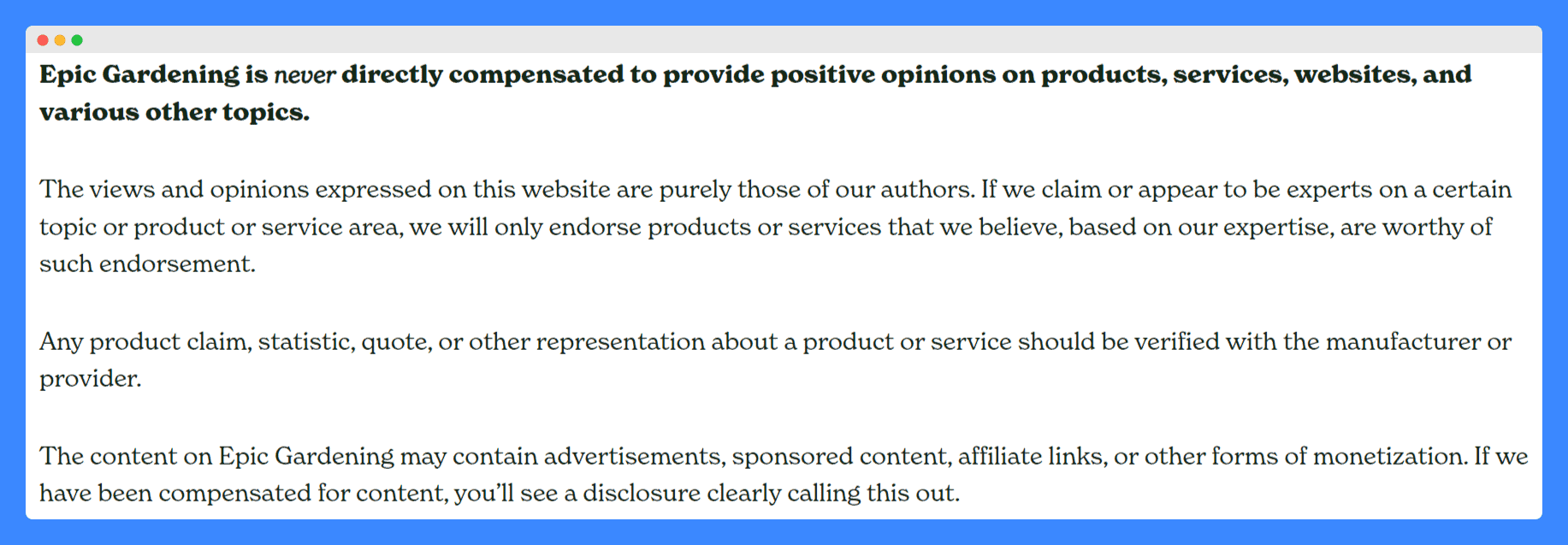
The disclaimer emphasizes the site’s commitment to providing honest and unbiased opinions, reassuring readers that product endorsements are based on genuine expertise.
The additional clarification regarding product claims and the encouragement to verify information further enhances its effectiveness.
6. GoodReads
GoodReads sets a strong example for media outlets by using a review disclaimer that clearly delineates the relationship between user-generated content and the platform.
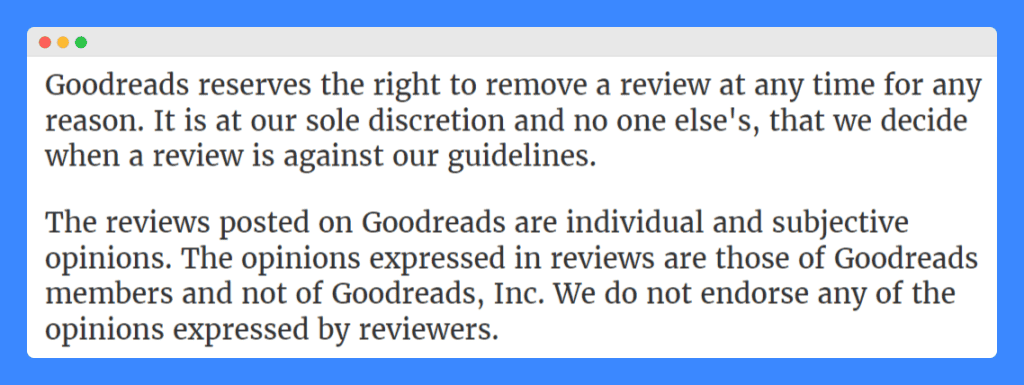
Their disclaimer helps maintain the site’s role as a neutral facilitator of community discussions. The mention of the platform’s right to remove reviews reinforces its commitment to maintaining quality and adherence to community standards.
This is one of the reasons why the site continues to have an open yet controlled environment for honest expression and discussion.
Sample Review Disclaimer Template
This sample review disclaimer template is designed as a starting point for creating your own disclaimer for your website or blog. While it outlines the key components, it’s important to customize and enhance the content to suit your specific context and any particular legal considerations.
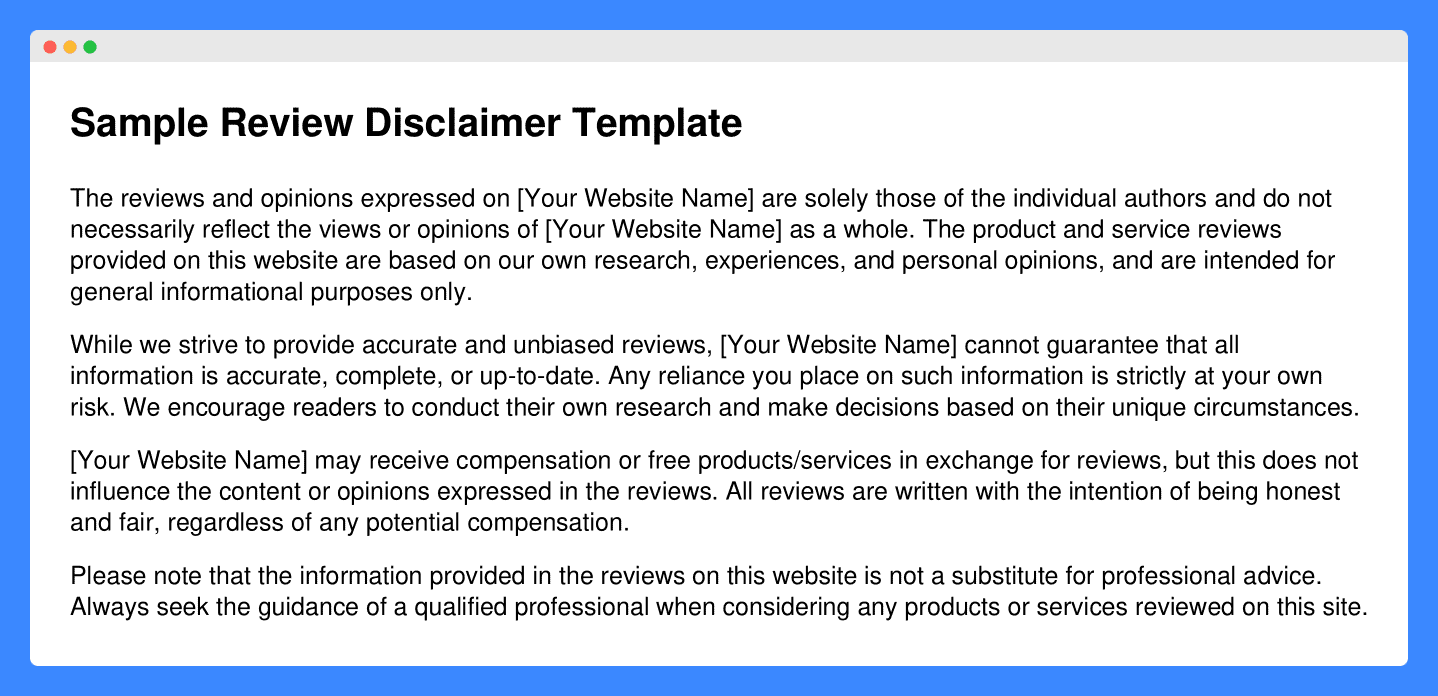
Frequently Asked Questions
Do review disclaimers apply to sponsored reviews?
Yes, review disclaimers apply to sponsored reviews. They disclose any compensation received through the sponsorship, helping maintain transparency.
Are review disclaimers legally required?
Yes, review disclaimers are legally required for transparency. They comply with FTC guidelines.
Can a review disclaimer influence customer trust?
Yes, a review disclaimer can boost customer trust. It shows transparency and honesty.
Should I have a separate disclaimer for third-party reviews?
Yes, a separate disclaimer for third-party reviews clarifies source and impartiality.
Can I integrate my review disclaimer into my terms and conditions?
Yes, you can integrate a review disclaimer into your terms and conditions. This ensures visibility and clarity.



